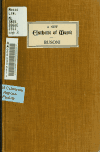Sketch of a new esthetic of music
by Ferruccio Busoni ; translated from the German by Th. Baker.
Published
1911
by
G. Schirmer
in
New York
.
Written in English.
The creator should take over no traditional
law in blind belief, which would make him
view his own creative endeavor, from the outset,
as an exception contrasting with that law. For
his individual case he should seek out and formulate
a fitting individual law, which, after the first complete
realization, he should annul, that he himself
may not be drawn into repetitions when his next
work shall be in the making.
The function of the creative artist consists in
making laws, not in following laws ready made.
He who follows such laws, ceases to be a creator.
Creative power may be the more readily recognized,
the more it shakes itself loose from tradition.
But an intentional avoidance of the rules cannot
masquerade as creative power, and still less
engender it.
The true creator strives, in reality, after perfection
only. And through bringing this into harmony
with his own individuality, a new law arises without
premeditation.
.jpeg&container=blogger&gadget=a&rewriteMime=image%2F*)
FEELING
“Feeling” is generally understood to mean
tenderness, pathos, and extravagance, of expression.
But how much more does the marvelous flower
“Emotion” enfold! Restraint and forbearance,
renunciation, power, activity, patience, magnanimity,
joyousness, and that all-controlling intelligence
wherein feeling actually takes its rise.
It is not otherwise in Art, which holds the mirror
up to Life; and still more outspokenly in Music,
which repeats the emotions of Life—though for
this, as I have said, taste and style must be added;
Style, which distinguishes Art from Life.
What the amateur and the mediocre artist
attempt to express, is feeling in little, in detail,
for a short stretch.
Feeling on a grand scale is mistaken by the
amateur, the semi-artist, the public (and the
critics too, unhappily!), for a want of emotion,
because they all are unable to hear the longer
reaches as parts of a yet more extended whole.
Feeling, therefore, is likewise economy.
Hence, I distinguish feeling as Taste, as Style,
as Economy. Each a whole in itself, and each
one-third of the Whole. Within and over them
rules a subjective trinity: Temperament, Intelligence,
and the instinct of Equipoise.
These six carry on a dance of such subtility in
the choice of partners and intertwining of figures,
in the bearing and the being borne, in advancing
and curtesying, in motion and repose, that no
loftier height of artistry is conceivable.
When the chords of the two triads are in perfect
tune, Fantasy may—nay, must—associate with
Feeling; supported by the Six, she will not degenerate,
and out of this combination of all the elements
arises Individuality. The individuality catches,
like a lens, the light-impressions, reflects them,
according to its nature, as a negative, and the
hearer perceives the true picture.
Musical art is like a child that has learned to walk, but still has to be led. It is a virgin art that has not yet experienced life or suffered. It has no sense of how to array itself, no awareness of its advantages, its unawakened capacities. At the same time, it is a wunderkind that is already able to create beautiful things and bring joy to many, and on account of this, it is generally assumed to be fully formed. Music as an art, our so-called Western music, is barely four hundred years old. It is in a state of development – perhaps even at the very first stage of an infinitely long development – and yet still we talk about ‘classics and ‘hallowed traditions’!
We have formulated rules, defined principles, laid down laws – laws conceived for an adult, but applied to a child that does not yet know the meaning of responsibility. Young as this child is, it already possesses one radiant quality that distinguishes it from its older sisters. The law-makers are reluctant to recognise this wonderful attribute, as it overturns all their rules. This child – it floats on air! Its feet do not touch the ground. It knows no law of gravitation. It is practically incorporeal. Its material is transparent. It is sonorous air. It is almost Nature itself. It is free.
We have formulated rules, defined principles, laid down laws – laws conceived for an adult, but applied to a child that does not yet know the meaning of responsibility. Young as this child is, it already possesses one radiant quality that distinguishes it from its older sisters. The law-makers are reluctant to recognise this wonderful attribute, as it overturns all their rules. This child – it floats on air! Its feet do not touch the ground. It knows no law of gravitation. It is practically incorporeal. Its material is transparent. It is sonorous air. It is almost Nature itself. It is free.

(~64 pg)Read Online
(1.8 M)PDF
(1.3 M)B/W PDF
(169.6 K)EPUB
(~64 pg)Kindle
(~64 pg)Daisy
(61.6 K)Full Text
(887.2 K)DjVu
(1.8 M)PDF
(1.3 M)B/W PDF
(169.6 K)EPUB
(~64 pg)Kindle
(~64 pg)Daisy
(61.6 K)Full Text
(887.2 K)DjVu
.jpg&container=blogger&gadget=a&rewriteMime=image%2F*)